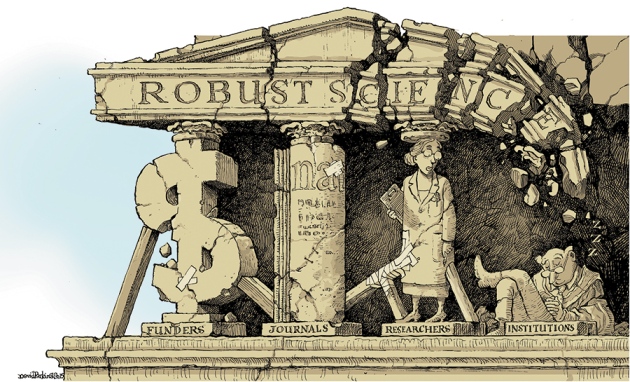Editor Sounds Alarm Over Falling Public Trust In Science
Science, pride of modernity, our one source of objective knowledge, is in deep trouble. Stoked by fifty years of growing public investments, scientists are more productive than ever, pouring out millions of articles in thousands of journals covering an ever-expanding array of fields and phenomena. But much of this supposed knowledge is turning out to be contestable, unreliable, unusable, or flat-out wrong. From metastatic cancer to climate change to growth economics to dietary standards, science that is supposed to yield clarity and solutions is in many instances leading instead to contradiction, controversy, and confusion. Along the way it is also undermining the four-hundred-year-old idea that wise human action can be built on a foundation of independently verifiable truths. Science is trapped in a self-destructive vortex; to escape, it will have to abdicate its protected political status and embrace both its limits and its accountability to the rest of society. --Dan Sarewitz, The New Atlantis, Summer 2016
Jeremy Berg is taking on one of the most influential jobs in science just as the scientific endeavour is facing a challenge of historic proportions. As the new editor-in-chief of Science, a highly selective journal that still has the controversial power to make scientific careers, the biochemist and former University of Pittsburgh senior manager is worried about an apparent rejection of science by some parts of the public – and thinks that academics should look closely at how their own behaviour may have contributed. Too often they have gone beyond explaining the scientific situation and ventured into policy prescriptions, notably in the case of climate change, he thinks. --David Matthews, Times Higher Education, 18 August 2016
For a sense of how far the left will go to enforce climate-change orthodoxy, read the recently released “Common Interest Agreement” signed this spring by 17 Democratic state attorneys general. The officials pledged to investigate and take legal action against those committing climate wrongthink. Beginning late last year, the attorneys general of Massachusetts, New York and the U.S. Virgin Islands, all signatories to the agreement, issued broad-ranging subpoenas against Exxon Mobil and conservative think tanks. They sought documents and communications related to research and advocacy on climate change. Concerned that these investigations were designed to chill First Amendment rights, the House Committee on Science, Space and Technology issued its own subpoenas. In mid-July the committee, led by Rep. Lamar Smith (R., Texas), asked the attorneys general to produce their communications with environmental groups and the Obama administration about their investigations. They have indignantly refused to comply. --Elizabeth Price Foley, The The Wall Street Journal, 22 August 2016
Climate-change activists are mobilizing to cut the birthrate, arguing that richer nations should discourage people having children in order to protect them from the ravages of global warming and reduce emissions. Travis Rieder, assistant director of the Berman Institute of Bioethics at Johns Hopkins University, told NPR that bringing down global fertility by half a child per woman “could be the thing that saves us.” He proposed procreation disincentives such as government tax breaks for poor people and tax penalties for rich people, a kind of “carbon tax on kids.” --Valerie Richardson, The Washington Times, 19 August 2016
‘We have fallen upon evil times, politics is corrupt and the social fabric is fraying.’ Who said that? Donald Trump or Bernie Sanders? Nigel Farage or Marine Le Pen? It’s difficult to keep track. They sound so alike, the populists of the left and the right. Everything is awful, so bring on the scapegoats and the knights on white horses. Pessimism resonates. A YouGov poll found that just 5 per cent of Britons think that the world, all things considered, is getting better. You would think that the chronically cheerful Americans might be more optimistic — well, yes, 6 per cent of them think that the world is improving. More Americans believe in astrology and reincarnation than in progress. So who did say those words at the start of this article, about how we have ‘fallen upon evil times’? It wasn’t Trump. It wasn’t Farage. A century ago, an American professor found them inscribed on a stone in a museum in Constantinople. He dated them from ancient Chaldea, 3,800 BC. --Johan Norberg, The Spectator, 20 August 2016
Brought to you by Benny Peiser's Global Warming Policy Forum

No comments:
Post a Comment